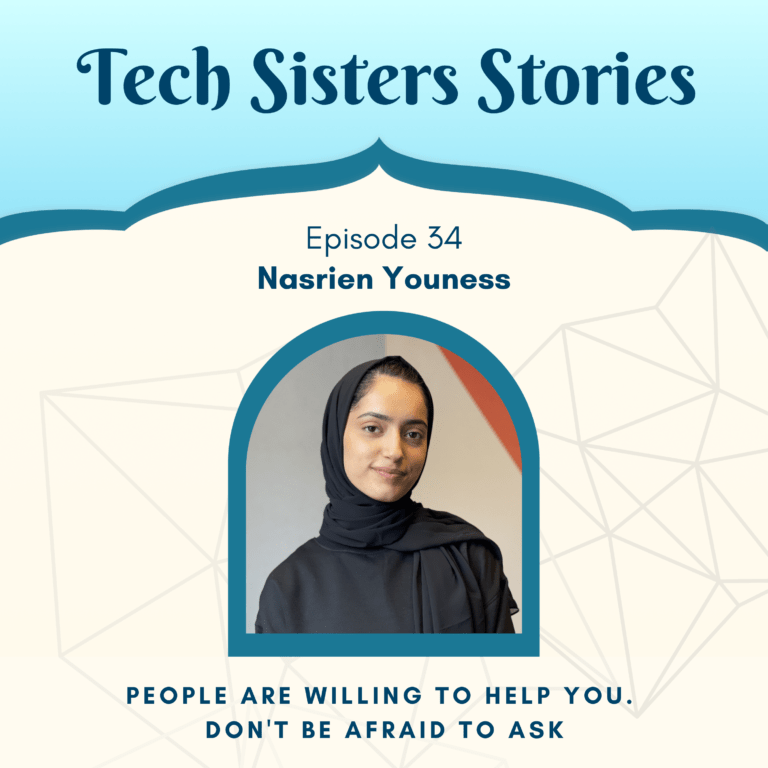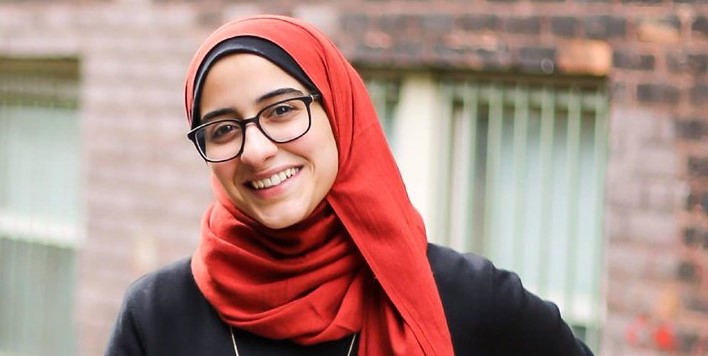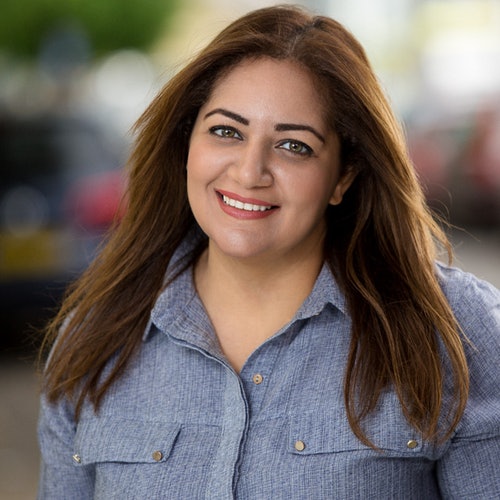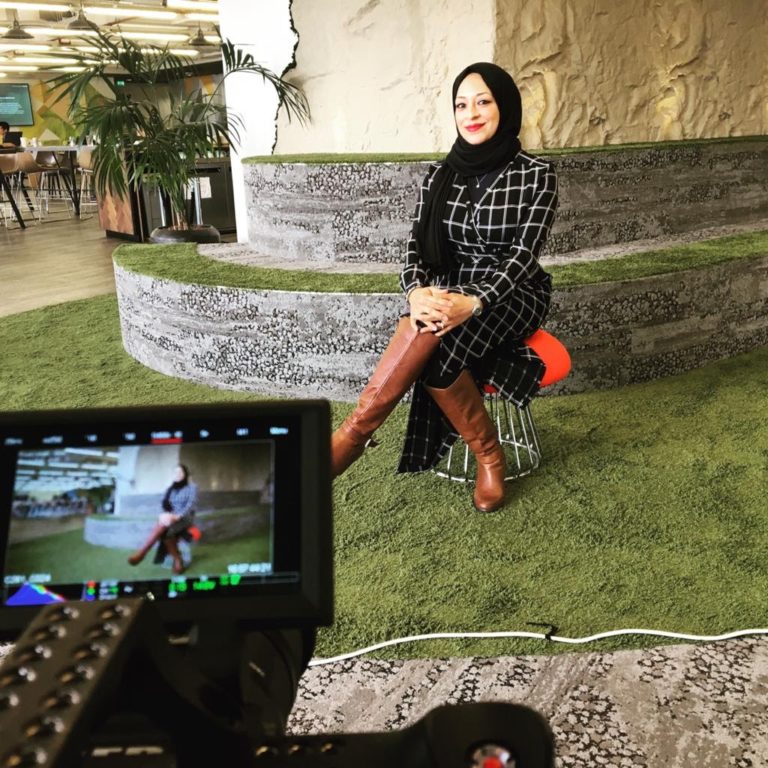Fatima Zohra Benhamida — Never Stop Working On Your Amazing Dreams
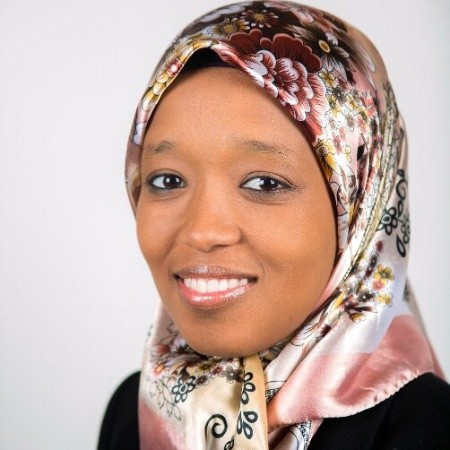
Fatima Zohra Benhamida is a cheerful and creative lecturer with over a decade of scientific research and higher education experience. She enjoys guiding her students with a clear and practical process to build their projects and easily understand new knowledge. As a researcher, she uses her sense of innovation and problem solving to create better solutions for current challenges.
Fatima is a strong advocate of promoting technology access for every person, especially women and girls in isolated regions. She frequently gives talks to spread awareness among worldwide communities and inspire Algerian youth. Fatima was recently awarded as a Microsoft Most Valuable Professional (MVP) and Microsoft Humans of IT Community Ambassador in recognition of her active commitment to helping the IT community thrive professionally and socially.
We’re so excited to welcome Fatima Zohra Benhamida as our latest Tech Sister!
Can you describe how you first got into tech?
When I was a student in high school, everyone expected that I would study medical science. I got good grades, and medicine was sort of the only acceptable career for top students in Algeria back then. But I hated it! I wanted to study anything but medicine!
It was time to brainstorm and figure out what I should study instead. I knew that I liked critical thinking, maths, problem-solving, and algorithms. Sometimes I felt like I work like a robot because I love using algorithms to solve problems.
When I saw that computer science combined all the things I excel in, I said, let’s go. So I went with it, and I never regretted choosing computer science.
Would you like to describe your career journey so far?
I graduated as a computer science engineer in 2006 and did two years of postgraduate studies. Then I felt like it was time to experience what working in the industry felt like and took on an engineering position at Algeria’s top power and gas company. It was an incredibly enriching experience and taught me a lot about what it means to be a woman in tech. I got to experience being the only woman at the meeting table, participating in important decisions, along with very high ranking people in the company.
Then I felt passionate about learning more about computer science. I went back to my university and got a Ph. D. Afterward, I decided to continue with teaching and research. Since 2010, I’ve been teaching students and conducting scientific research in computer science. Now, I’m an assistant professor senior researcher in computer science.
From your perspective as a professor, what are the main struggles for female tech students? What do you think can be improved?
First, let me say that I was a computer science student at the same university where I currently teach. So my perspective on this topic is rather unique. When I was a student, about 10% of students over the whole university were women. In my class of thirty students, only three were women. I can still remember their names after nearly twenty years!
Now, I’m delighted to say that half of the students in my class are women. In the same university, we went from 10% to 50%. This increase is partly due to the changed perception of computer science as a major throughout Algerian society. More people understand that computer science is hugely in demand and can lead to a successful future. This has helped high school students and their parents consider computer science rather than just medical science.
That’s the positive side. The negative side is that there are still many harmful stereotypes about women and coding. That we’re not as good developers as men. Sometimes these stereotypes prevent women from getting the best job opportunities.
This is absolutely something we should be working on. But again, I’m very proud and happy that we’re making so many advancements. The percentage of women enrolling in computer science is increasing. More women are leading university clubs and are involved in other types of extracurricular activities. And more women are participating in hackathons, workshops, and international competitions. I’m very proud of how far we’ve come.
From your time spent volunteering and mentoring, how can we help more women start and build their tech careers?
I think that the biggest problem now is how society puts barriers around women, preventing them from making the best decisions for themselves. Many women message me to ask how I overcame so many things to get where I am. They tell me that they’re struggling to be free and follow their dreams. To do what they want to do with their lives.
Many people around us, like our parents, relatives, and neighbors, have opinions on what we do in our lives. They think that their opinions matter more than our own. That we should follow their advice for things that depend on our own dreams and motivation. And they apply these standards unequally and unfairly. When boys act in a way that goes against expectations, they go unquestioned and even supported. While girls who do the same thing experience more restrictions and scrutiny.
When you’re restricted from going to the best universities, you can’t get the best for yourself, you can’t improve to the next level. Sometimes women are expected to be married by a certain age, have lots of children, and spend all of her time caring for her family. And the dream of getting a Ph.D. or attaining an influential role at work feels impossible and far away.
But I accomplished all of that. I have two children, and I got my Ph.D. when my son was only 9 months old. I’m blessed that my family is very supportive. Still, I had to be firm and make sure that the people in my life understood that I needed my Ph.D. and nothing would stop me from getting it.
Speak up and share your story
Silence gives power to stereotypes and allows them to come true. Speaking up will help make the people around you realize that there’s no harm in what you’re doing, and it’s the right thing to do. As you speak more about your experiences and share resources, you make it easier for more women to take those steps, or even realize that these opportunities exist. I’m very actively engaged in female empowerment because I can see how volunteering inspires more women and impacts their lives.
I think it’s important to acknowledge and feel grateful for the support around you. Even if you believe that the people in your life are doing nothing beyond giving you your rights. It’s good to tell them that you’re thankful they’re doing that and are not being influenced by society’s opinion of what a woman should do. You can say things like, “Thank you so much, my husband, for letting me go after this opportunity.” Or, “Thank you so much, my parents, for believing in me when I was young.” This will resonate and help other women. You’re doing it for them.
What’s something mentees can do to get the best results from mentoring?
This is such an important question, and this is an area I’m really passionate about. I believe that the best thing mentees can do is have a learning mindset. Don’t come seeing one answer to a specific question, but come seeking how to solve any problem. Your mentor isn’t there to solve your problems for you. You need to learn from your mentor best practices to solve the issues you’re facing right now, and anything that might come up in the future.
Another crucial factor in successful mentoring is breaking the ice between mentor and mentee and making the relationship like a friendship. It shouldn’t be like I’m the boss, and I expect you to follow everything I say without question. The dynamic should be relaxed and honest enough so that the mentee feels comfortable expressing their unique needs, struggles, and strengths with their mentor. And now, with a more holistic view of their mentee, the mentor can give better advice on how the mentee can use their strengths to leverage other skills and get what they want.
Have a learning mindset and stay committed
Remember that mentorship isn’t standard. It’s very unique for each person. Sometimes you might mentor someone who is very shy, and you need to find ways they can use their introversion to their advantage. Or maybe your mentee struggles with learning technical skills, and you’ll need to help them find and use tools that make learning funny, easy, or catchy.
Mentees should first come with a learning mindset and be committed to the process. And the mentor needs to be just as committed not to miss meetings, to deliver work on time, to have good project management. But mainly be dedicated to learning best practices, not answers for specific problems. Problems will never end. But once we learn the best practices, we can use them at any time and for any situation.
Do you think more Muslim women should get into tech? Why or why not?
Absolutely! But not only tech, but Muslim women should also do whatever they want to do. Medical doctors, programmers, astronauts, stay at home mothers – it doesn’t matter, we can do it! If we have the dream to do something and the conviction to follow it, we can do anything. I’m definitely encouraging everyone to go after any dream or idea, or crazy project they want to do.
But specifically with tech, yes, we need more Muslim women because we need to inspire others. Sometimes people have that dream, but they’re waiting to make the first step because they’re waiting for a role model. If we believe that we can be a role model for someone else, we can all make that first step together.
What are you most proud of? What did you do, and why is it so special to you?
I’m most proud of how I did my Ph.D. thesis. Doing my Ph.D. research was extremely challenging because I couldn’t access the databases I needed due to a lack of resources. I was also working at the time and just got married. I actually had my first baby when I decided to focus and finish my thesis.
One of the thesis requirements was getting a paper published in a recognized academic journal. I really wanted my work to be visible in one of the best journals in my field and worked incredibly hard on this paper. My son was only 10 days old when I submitted the first version. He would wake up hungry every few hours, so I was barely sleeping, but I still had to finish my work. I’ll never forget feeding him with one hand and coding with the other so that I could complete the last modifications and submit my paper on time. And I did it!
I’ve accomplished many other things since then, but this example is still very precious to me. I feel like this summarizes how women balance so many roles and overcome difficulties. Even though I was a new wife and mom, working in a challenging environment, and lacked resources, I was able to push through and overcome it. And you can do it too! You can reach your goal! Don’t worry about how long it takes you to do something; you’ll get there eventually!
What is something in your journey that you regret or wish you did differently?
When I was a young student, I was focused entirely on my technical studies and wasn’t interested in “soft skills.” Once I started working in the industry, I realized that technical knowledge only goes so far. You have to know how to work with people, to be part of a team. And I didn’t have that. I felt so shy and didn’t even know how to speak up for myself and defend my opinions.
Now, alhamdulillah, things are getting better. My university added many courses about soft skills project management to the computer science program. How you can present your work and write good documentation. How to speak up for yourself and get your team to the best place it can be.
If I could go back to my younger self, I would choose to do extracurricular activities to experience the world outside of the university. I encourage all students to join academic clubs, enter competitions, and work on themselves. When you leave university, that line on your CV that says you’re an engineer from a great university isn’t your whole story. What makes you stand out are the other things, the projects you worked on, the lessons you learned, and the contributions you made along the way.
Do you think that the shyness and lack of soft skills you described were made worse because you went into a very male-dominated company?
To be honest, I think yes. Sometimes it feels like our male colleagues hear us but don’t care. That happens even if someone isn’t shy, and she speaks up and gives her opinions. A male colleague can say the same thing as a woman, stealing her ideas, and people will say it’s great and follow him.
It wasn’t only my problem; it wasn’t just my shyness. The environment I was in wasn’t willing to listen to me. That’s why we need to make double the effort. Not only to overcome shyness but to be a good speaker. And not just to be a good speaker, but to be the best speaker. We need to be insistent and make our voices heard twice.
What is something or someone in your tech journey that you’re grateful for?
I’m definitely grateful for my husband. He’s in tech himself and has always supported me in my career. I’m also grateful for my boss. He once made me a project manager on an international project without waiting for my decision. He believed in my skills and strength before I did. And he helped me discover my strengths and abilities. I’m really grateful for the way he mentored me.
Is there anything else you would like to add?
Sometimes, when people hear your story or follow your career, they think they need to follow your exact footsteps to be successful. They’ll think, “OK, from now on, I’m going to do the exact same things Fatima did.” Don’t try to follow my path, make your own!
If I could just say one thing, it would be: Believe in your dreams. Don’t let obstacles stop you. It doesn’t matter what your obstacles are: the people around you, the environment you’re in, the resources you have access to. When you believe in something hard enough, you can stick with it. You’ll fight, and fail, and rise again until you get there. You have to fight for your dreams, and I know you can do it!
